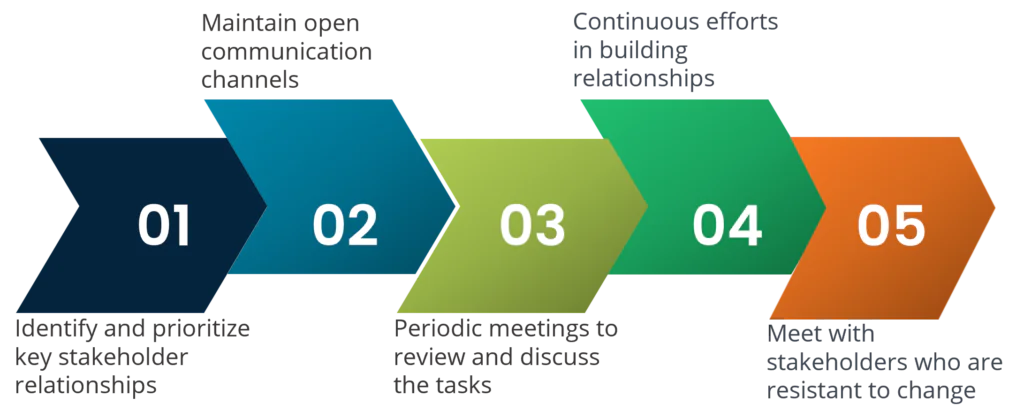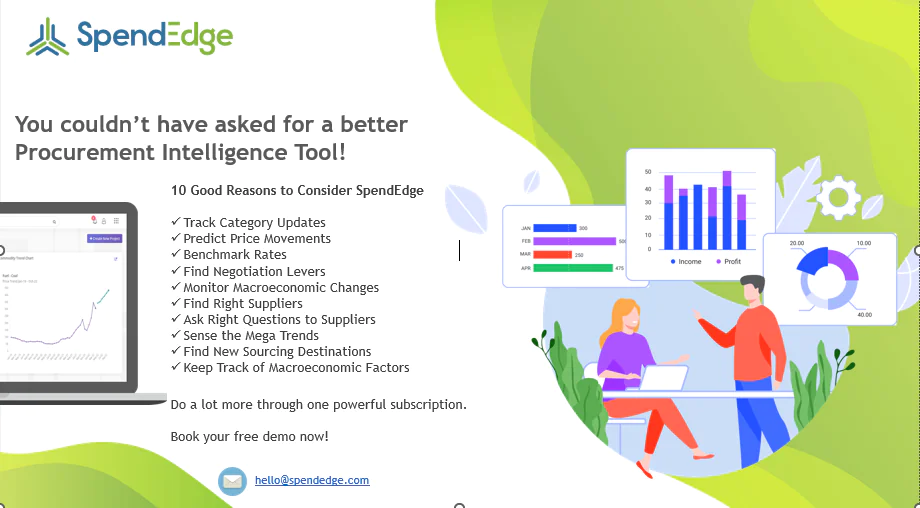Stakeholders refer to individuals, groups, or organizations with a vested interest, concern, or investment in a particular project, initiative, or system. They can either be impacted by or have an impact on the outcomes of a process, decision, or activity. Stakeholders can include a wide range of parties. It is crucial to understand and manage the interests and expectations of these stakeholders for the success and sustainability of projects, businesses, or initiatives. Effective stakeholder engagement involves communication, collaboration, and addressing the needs and concerns of various stakeholders to ensure a positive impact and support for the endeavor.
Effective communication, understanding stakeholder needs, and collaborative decision-making are vital for strengthening stakeholder relationships in procurement. Regular updates and transparent communication build trust, while assessing stakeholder needs informs tailored strategies. Involving stakeholders in decision-making fosters a sense of ownership and ensures alignment with organizational goals. These practices contribute to positive engagement, smoother procurement processes, and the establishment of enduring partnerships with both internal and external stakeholders.
Here are the strategies for strengthening stakeholder relationships in procurement

Identify and prioritize key stakeholder relationships:
Identifying and prioritizing key stakeholder relationships is a critical strategy in procurement. Begin by mapping and analyzing stakeholders to discern their influence, interests, and expectations. Prioritize those with significant impact on procurement outcomes or those affected by the process. Tailor communication and engagement strategies based on each stakeholder’s importance, ensuring more dedicated attention to key players. Understanding their specific needs allows for customized approaches, fostering trust and collaboration. By concentrating efforts on high-impact relationships, procurement specialists can allocate resources effectively, streamline communication, and build stronger, more meaningful partnerships that contribute directly to successful procurement outcomes and organizational objectives.
Maintain open communication channels:
Maintaining open communication channels is a vital strategy for bolstering stakeholder relationships in procurement. Regular and transparent communication ensures that stakeholders are well-informed about procurement processes, changes, and achievements. Establishing feedback mechanisms encourages stakeholders to express concerns or insights, fostering a collaborative environment. This openness builds trust, reduces uncertainty, and aligns expectations. It also allows procurement specialists to address issues promptly, demonstrating responsiveness to stakeholder needs. Clear and consistent communication creates a foundation for positive engagement, promoting a shared understanding of goals and contributing to the overall success of procurement activities within the organization.
Periodic meetings to review and discuss the tasks:
Conducting periodic meetings to review and discuss tasks is a potent strategy for fortifying stakeholder relationships in procurement. Regular engagement provides a structured platform to share progress, address concerns, and align expectations. These sessions facilitate open dialogue, enabling stakeholders to contribute insights and perspectives. It demonstrates a commitment to collaboration, ensuring everyone is on the same page regarding procurement tasks, timelines, and potential challenges. Through active participation and information exchange, stakeholders feel valued and informed, fostering a sense of ownership in the procurement process. This strategy enhances transparency, minimizes misunderstandings, and reinforces a cooperative and constructive relationship between procurement specialists and stakeholders.
Continuous efforts in building relationships:
Continuous efforts in building relationships are a fundamental strategy for strengthening stakeholder relationships in procurement. This involves ongoing engagement, beyond specific procurement activities, to nurture connections with stakeholders. Regular communication, relationship-building initiatives, and feedback mechanisms contribute to a dynamic and evolving partnership. By demonstrating a long-term commitment to collaboration, procurement specialists can foster trust, understand changing stakeholder needs, and adapt strategies accordingly. This proactive approach ensures that relationships remain robust, resilient, and responsive to the evolving dynamics of both the procurement landscape and the broader organizational context, ultimately contributing to sustained success and positive outcomes.
Meet with stakeholders who are resistant to change:
Addressing stakeholders resistant to change in procurement involves personalized, one-on-one meetings to understand concerns and foster open communication. Actively listening to their perspectives enables insight into specific barriers. Clearly articulate the benefits of proposed changes, emphasizing alignment with organizational goals and potential positive outcomes. Providing information, such as relevant data and successful case studies, can help alleviate concerns and build confidence. By engaging stakeholders individually, addressing their unique perspectives, and offering compelling reasons for change, procurement specialists can mitigate resistance, garner support, and facilitate a smoother transition toward more effective procurement processes.
How can SpendEdge help organizations in stakeholder relationship management?
SpendEdge, a procurement market intelligence solutions provider, aids organizations in stakeholder relationship management by offering tailored insights and strategies. Our expertise helps identify and prioritize key stakeholders, providing data-driven analyses to understand interests and concerns. Our experts assist in maintaining open communication channels through regular updates and transparent reporting. Continuous efforts in relationship-building are supported with market intelligence, ensuring proactive adaptation to stakeholder needs. With a focus on collaboration, SpendEdge enables procurement specialists to navigate challenges, mitigate risks, and strengthen relationships, contributing to successful procurement outcomes aligned with organizational objectives.





